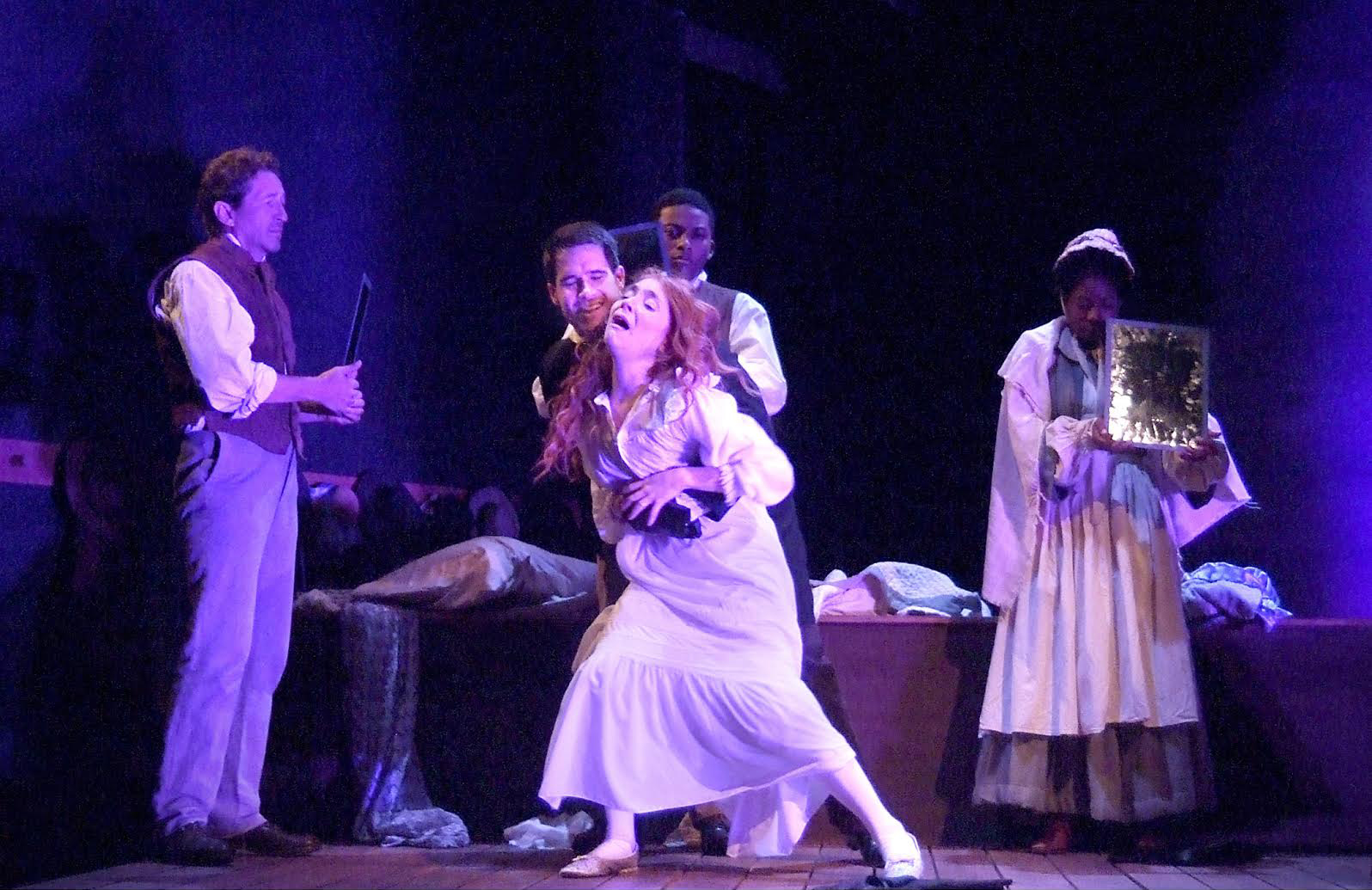Alum’s play ‘When Stars Align’ seeks to mirror current race relations

Written by UCLA alumna Carole Eglash-Kosoff, the play “When Stars Align” centers around a romance between Thaddeus, a black slave, and Amy, a white girl brought up in high society. (Odyssey Theatre)
Location: Odyssey Theatre
Showtimes: Through Oct. 4, Times vary
Cost: $30
By William Thorne
Sept. 25, 2015 6:52 a.m.
Thaddeus meets Amy along the banks of the muddy Mississippi River, under magnolia trees draped with Spanish moss. At first he is afraid of her.
He knows the consequences of playing together, but she convinces him: She wants to catch frogs and so does he. However, their friendship cannot last, as he is a black slave on a plantation in Louisiana, and she is a white girl brought up in high society.
Written by UCLA alumna Carole Eglash-Kosoff, the play “When Stars Align” takes place over a 40-year period encompassing the Civil War. It centers around the star-crossed romance between Amy and Thaddeus but also incorporates the stories of other slaves and their masters on the plantation. “When Stars Align” is currently playing at the Odyssey Theatre, with five more performances until it closes Oct. 4.
Eglash-Kosoff is no stranger to plays dealing with race. Last year, she brought her play “The Human Spirit,” based on South African apartheid stories, to the Odyssey Theatre.
She said despite differing contexts, the two plays bear the same message of the need to look beyond race and focus on the person’s character.
“When will we grow out of this idiocy of looking at someone’s color and making all of these predeterminations,” Eglash-Kosoff said.
Haley McHugh, a UCLA alumna who plays Amy, said she feels “When Stars Align” covers important ground in terms of the social and race issues that America sees today.
She said the racial hate crimes portrayed in “When Stars Align” became all too real when a church shooting that occurs in the play was mirrored by the Charleston shooting, which took place while the actors were in a rehearsal.
“It was extremely harrowing to be rehearsing that scene when the same thing happened in real life,” McHugh said.
At the beginning of “When Stars Align,” the plantation owner’s son forces himself on a female slave, and Thaddeus is born from the rape. For McHugh, the story of Thaddeus’ mother is both tragic and at times difficult to watch.
“We follow her story, her loneliness, her finding love many years later and then losing that love,” McHugh said.
McHugh portrays her character all the way from a naive 12-year-old girl, through puberty and into her forties. She said as time passes in the play, Amy’s relationship with Thaddeus develops in two distinct ways.
The first is a change in their feelings for each other and in their social habits. Amy swaps dirty, baggy overalls for long dresses, and Thaddeus suddenly discovers a new kind of affection for Amy which goes beyond friendship.
The second is how their relationship and maturity develop in relation to the social climate around them. In the beginning, Amy is not conscious of the taboo they are breaking in spending time with together. However, her view of their relationship is shaken when she becomes aware of lynch mobs and brutal acts carried out on slaves.

“Growing up, I (as Amy) see a runaway slave killed in front of me and it’s a huge moment (for me), as I realize that could happen to us,” McHugh said.
Kaitlin Huwe, a UCLA alumna and understudy for the roles of Amy and her sister Elizabeth, said Thaddeus and Amy’s developing consciousness of their social positions threatens the sweet, human connection between them.
“Their relationship just goes to show that racism is something that is taught and engineered. It’s not something that’s natural,” Huwe said.
Amy and Thaddeus try to reconcile the pragmatic view that their relationship is dangerous. Eglash-Kosoff said the realization that their society is far from ready for a mixed-race relationship is a bitter, almost impossible pill to swallow.
Although she said performing in “When Stars Align” has allowed her to realize how far society has come in terms of racial equality, McHugh also feels this progress makes Amy and Thaddeus’ story and the story of all slaves from American history feel even more tragic.
“Throughout the play, Thaddeus and I are waiting for the stars to align for us,” McHugh said. “We keep thinking it’s going to be the time for our stars to align and for everything to finally fall into place, but we keep holding out that hope and it keeps on missing.”


